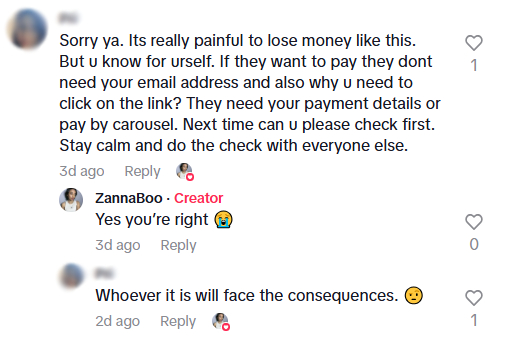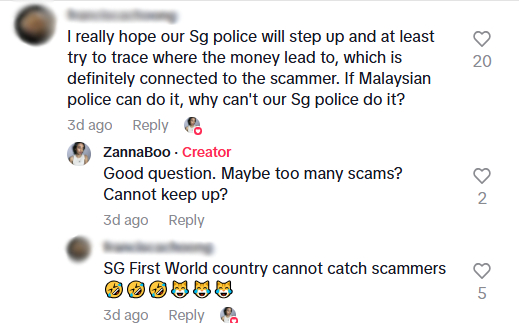TikToker left with only S$60 after falling for phishing scam from fake buyer on Carousell
A TikToker in Singapore was left with only S$60 in her bank account after falling for a Carousell phishing scam while trying to sell her washing machine. The “buyer” sent a fake email linking to a spoofed website requesting her bank details. Carousell later said it was aware of the incident and urged users to stay vigilant.

- A TikToker lost all but S$60 from her bank account after falling for a phishing scam while selling her washing machine on Carousell.
- The scam involved a fake “CarouPay” email and a chatbot named “Sophie” that tricked her into approving fraudulent transactions.
- Carousell confirmed awareness of the incident, noting over 309,000 scam reports in 2024 and reminding users never to share bank details.
SINGAPORE: A TikToker says she was left with just S$60 in her bank account after her savings were wiped out in a phishing scam while trying to sell her washing machine on Carousell.
TikTok user @zannaboo posted a video on 23 October, recounting how she lost her money on Deepavali.
“On Deepavali, I gave the biggest ang pao I could have ever given in my life,” she said.
In her video, Zanna explained that she had listed her washing machine for sale when a supposed buyer messaged her, saying he was interested but was currently overseas.
He then asked her to contact his wife instead.
Zanna messaged the wife, who told her the washing machine “looked good” but that she could only pay through “CarouPay”, a payment method Zanna had never used before.
“Mind you, it was my first time using CarouPay. Usually, it’s PayNow or cash, right?” she said.
When Zanna told the woman it was her first time using the service, the wife reassured her not to worry and asked her to provide her email address, saying she would receive a payment link.
“First red flag — which I was so stupid to ignore,” Zanna said.
Zanna soon received an email that appeared to be from “Carousell LTD”, complete with official-looking branding.
“I thought it was a real email,” she said.
The message directed her to a fake website requesting her bank details to set up a supposed CarouPay account.
After entering her information, she was contacted by a chatbot named ‘Sophie’, which guided her through what seemed like a legitimate payment process.
The chatbot instructed her to click on her digital token and approve a transaction — which led to the first unauthorised deduction from her account.
It then demanded that she top up her account with at least S$1,500 to recover the lost money.
When she refused, “Sophie” suggested borrowing from friends or family.
That was when Zanna realised she had been scammed.
Upon noticing the missing funds — leaving her with only S$60 in her account — Zanna immediately contacted her bank.
However, she was informed that the money could not be recovered and was advised to file a police report.
She told The New Paper that she lodged an online report and received a call from the police within two hours.
“They were asking me if I knew where the money went, which was so weird. Why would I go to the police if I already knew? From there, I knew recovering the money was a lost cause,” she said.
She later discovered that the Carousell account linked to the scam had already been deactivated, and she had not received any follow-up from the platform.
"I was pretty foolish to trust blindly. It was my own fault for not being vigilant. It's a very expensive lesson for me indeed," she said.
TikTok Reactions
At the time of writing, Zanna’s TikTok post has garnered over 133,600 views, with many netizens sharing similar scam experiences in the comments section.
One user wrote: “It’s really painful to lose money like this. Next time, please check first. Stay calm and verify with others.”

Another commented: “Thank you for speaking out — at least more people will know.”

Others urged stronger enforcement, with one saying: “I really hope our SG Police will step up and try to trace where the money went, which is definitely connected to the scammer.”

Another user suggested that Carousell take a more proactive approach by producing an instructional video for all users, explaining how to use CarouPay properly so that everyone can understand the process better and avoid becoming victims of scams.

Carousell: Over 309,000 Scam Reports in 2024
Speaking to The New Paper, a Carousell spokesperson confirmed awareness of the incident and reiterated the company’s efforts to educate users about emerging scams.
“Carousell does not ask sellers to provide bank information when buyers make a payment,” the spokesperson stressed.
The company also revealed that users had made over 309,000 scam reports in 2024, underscoring the growing threat of fraudulent activity.
Carousell added that it offers safety features such as Singpass verification and Buyer Protection, which withholds payment from sellers until buyers confirm receipt of their items.










